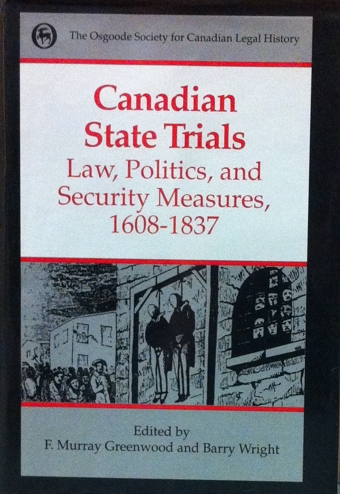
Canadian State Trials, Volume I: Law, Politics, and Security Measures, 1608-1837
edited by F. Murray Greenwood, Emeritus Professor of History, University of British Columbia and Barry Wright, Professor, Department of Law, Carleton University. Published with the University of Toronto Press, 1996.
State trials reveal much about a nation’s insecurities and shed light on important themes in political, constitutional, and legal history. In Canada, perceived and real threats to the state have ranged from dissent, disaffection, and the emergence of threatening ideologies to insurrection, riot, violent protest and military invasion. The Canadian State Trials series will explore the role of the law in regulating such threats, from the period of early European settlement to 1971. The first volume, and the planned series as a whole, present a great deal of new material by prominent Canadian historians and legal scholars. Although certain Canadian political trials and security crises have received scholarly attention in the past, there has never been a comprehensive and systematic examination of the country’s surprisingly rich record in this area. The eighteen essays in Volume I examine this record for the period 1608-1837, covering proceedings in New France, the four Atlantic colonies, the old province of Quebec, and the two Canadas. They highlight security law during the American revolution, the wars against revolutionary/Napoleonic France, and the War of 1812; comparative treason law; and the trials of David McLane, Robert Gourlay, Francis Collins, and Joseph Howe, among others. The essays, which make extensive use of primary sources ( the most illuminating of which appear in a documentary appendix), place the examination of the law and its administration during these events in socio-political and comparative context.
Related Topics
Contents
Contents
Foreword ix
Acknowledgments xi
Contributors xiii
Introduction: State Trials, the Rule of Law, and Executive Powers in
Early Canada 3
F. MURRAY GREENWOOD AND BARRY WRIGHT
PART ONE: c. 1608-1783
1 The Crime of Lèse-Majesté in New France: Defence of the Secular
and Religious Order 55
PETER N. MOOGK
2 The ‘Hoffman Rebellion’ (1753) and Hoffman’s Trial (1754):
Constructive High Treason and Seditious Conspiracy in
Nova Scotia under the Stratocracy 72
BARRY CAHILL
3 ‘Twelve Apostles’ or a Dozen Traitors? Acadian Collaborators
during King George’s War, 1744-8 98
THOMAS GARDEN BARNES
4 Civilians Tried in Military Courts: Quebec, 1759-64 114
DOUGLAS HAY
5 ‘Government by Will and Pleasure Instead of Law’: Military
Justice and the Legal System in Quebec, 1775-83 129
JEAN-MARIE FECTEAU and DOUGLAS HAY
6 Rebellion and Repression in Nova Scotia in the Era of the
American Revolution 172
ERNEST A. CLARKE and JIM PHILLIPS
PART TWO: c. 1783-1814
7 Sedition among the Loyalists: The Case of Saint John, 1784-6 223
D.G. BELL
8 Judges and Treason Law in Lower Canada, England, and the
United States during the French Revolution, 1794-1800 241
F. MURRAY GREENWOOD
9 The Official Mind and Popular Protest in a Revolutionary Era:
The Case of Newfoundland, 1789-1819 296
CHRISTOPHER ENGLISH
10 Sir James Craig’s ‘Reign of Terror’ and Its Impact on Emergency
Powers in Lower Canada, 1810-13 323
JEAN-MARIE FECTEAU, F. MURRAY GREENWOOD, and
JEAN-PIERRE WALLOT
11 State Trials and Security Proceedings in Upper Canada during
the War of 1812 379
PAUL ROMNEY and BARRY WRIGHT
PART THREE: c. 1814-37
12 Parliamentary Privilege and the Repression of Dissent in
the Canadas 409
F. MURRAY GREENWOOD and BARRY WRIGHT
13 The Attempted Impeachment of the Lower Canadian
Chief Justices, 1814-15 450
EVELYN KOLISH and JAMES LAMBERT
14 The Gourlay Affair: Seditious Libel and the Sedition Act in
Upper Canada, 1818-19 487
BARRY WRIGHT
15 Upper Canada in the 1820s: Criminal Prosecution and the Case
of Francis Collins 505
PAUL ROMNEY
16 Liberty of the Press in Early Prince Edward Island, 1823-9 522
J. M. BUMSTED
17 R. v. Howe (1835) for Seditious Libel: A Tale of
Twelve Magistrates 547
BARRY CAHILL
APPENDICES
1 Approaching an Iceberg: Some Guidelines for Understanding
Archival Sources Relating to State Trials 577
PATRICIA KENNEDY
2 Note on Sources 586
PATRICIA KENNEDY
3 Supporting Documents 596
Index 733
Reviews
The overall goal of the book is achieved. What emerges is a picture of an official class driven by personal goals and an almost paranoiac dislike of criticism to use and interpret the law in defence of its personal positions and its concept of an orderly top-down society. Ronald Stagg, Canadian Historical Review, vol 79, 1998, p. 600.
A fine addition to the corpus of Canadian legal history .... A subtle and often striking image of the intersection of law, politics, loyalty, security, and authority in colonial Canada up to the eve of the Rebellions. Jonathan Swainger, American Journal of Legal History, vol 42, 1998, p. 412.
In a time when the Charter is the sole focus of libertarian concerns, it is good to be reminded that the Canadian civil rights tradition goes back to the beginning of our political and legal systems. Roderick Macleod, Alberta Law Review, vol 35, 1997, p. 1135.
Louis A. Knafla, Canadian Journal of Law & Society, Vol 19, 2004, p. 201.
Donald Fyson, Revue d’histoire de l’Amerique française, Vol 52, 1999, p. 417.
Margaret McCallum, Acadiensis, Vol 27, 1998, p. 163.
Neil A. Campbell, Canadian Law Libraries, Vol 23, 1998, p. 69.
Hamar Foster, The Advocate (Vancouver Bar Association), Vol 55, 1997, p. 446.
Michael Boudreau, Dalhousie Law Journal, Vol 20, 1997, p. 275.
Reg Whitaker, Literary Review of Canada, Vol 6, 1997, p. 3.

